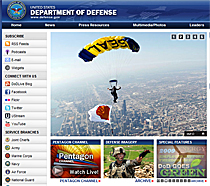By Al Pessin
Washington
19 August 2009  |
| Defense Department web site - www.defense.gov |
The U.S. Defense Department has become the latest establishment organization to venture into the Internet world of social networking. Officials from the generation of regular old mail, and maybe email, are trying to tweet, blog, post and "friend." It was just a few years ago, it seems, that email was a new, even exciting, way to communicate. Nowadays it is old hat. Send an email. Wait for a response. Usually it only involves two people.
The new way of communicating, known as social media or social networking, involves a potentially huge audience observing the conversation, and joining in. "They're for having dialogue and real-time conversations," said social media expert Geoff Livingston, a fellow at the Society for New Communications Research and author of a book on new media called "Now is Gone." He says the new concept behind such popular websites as Facebook, MySpace and Twitter creates both a challenge and an opportunity for any organization, like a government department, that wants to get a message out to the people it cares about.
"The issue that most organizations, military, government or just a plain old corporation, seem to have with social media is actually engaging people," he said.
It is that idea of engaging, interacting with, an audience that is new to organizations accustomed to one-way public communication, like putting out news releases. And on social media websites the engagement is very public, and may include audio and video.
U.S. Navy Petty Officer William Selby is on one of the Pentagon's YouTube channels, inviting anyone, and everyone, to post a video question for the senior U.S. military officer, the Chairman of the Joint Chiefs of Staff, Admiral Mike Mullen. Social networking has been largely a young people's domain, but the 62-year-old admiral has embraced it.
